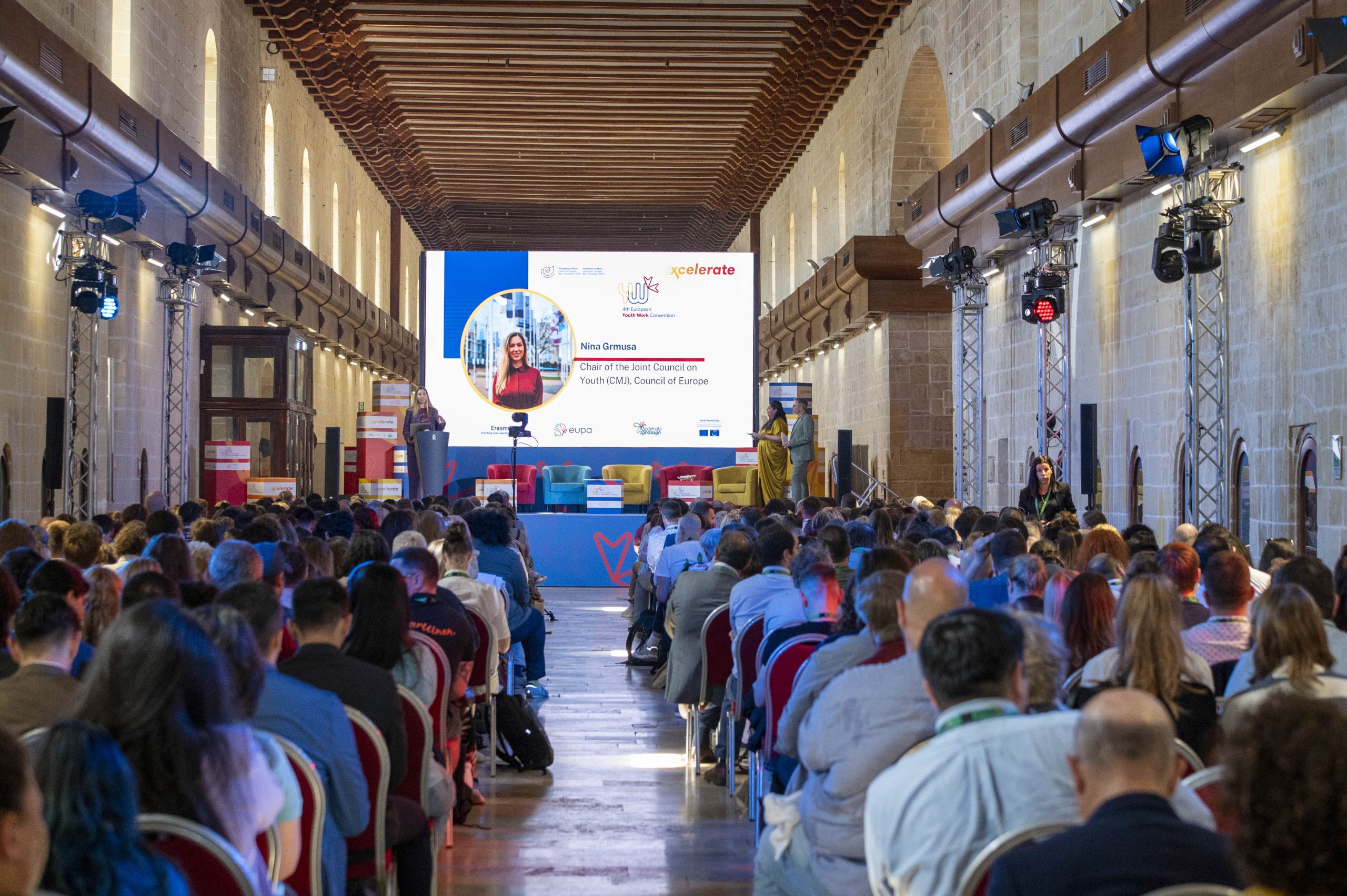VALLETTA, 27 to 29 May 2025 – The 4th European Youth Work Convention proved to be an intense, vibrant and energising occasion. The convention brought together over 500 participants from 42 countries across Europe as well as representatives from the European Commission, the Council of Europe, the European Parliament, the European Youth Forum, Councilof Europe Youth Advisory Council voluntary youth organisations and the wider youth work community including the Alliance of Youth Work Associations to discuss and consider the future of youth work in Europe.
The convention was hosted at the Mediterranean Conference Centre and organised by the Parliamentary Secretariat for Youth, Research and Innovation, together with Aġenzija Żgħażagħ, and the European Union Programme Agency (EUPA). It was one of the flagship events of Malta’s Chairpersonship of the Council of Europe.
European Youth Work Conventions have been a regular and significant forum for youth work policymakers, practitioners, and the wider youth work community, including researchers, voluntary youth organisations, and youth work service providers, aimed at promoting and strengthening youth work, further developing it, and fulfilling its potential in supporting and empowering young people.
The work of the three previous conventions – Ghent (2010), Brussels (2015) and Bonn (2020) – provided the context and paved the way for Malta’s hosting of the Convention.
The title of the convention, ‘Youthwork xcelerate – A Roadmap Towards a European Strategy for Youth Work reflects Malta’s commitment to advancing the recognition and development of youth work in Europe and providing the momentum needed to give both shape and direction in the next five years.
The main focus of the convention was to give voice to and listen to the youth work community – young people, youth workers, youth leaders, researchers, youth organisations and service providers – who work and interact with and support young people on an everyday basis.
To facilitate this, over 50% of the scheduled programme was devoted to small group workshops, where participants could listen and contribute to discussions on a wide range of thematic issues, including values and ethics, quality and standards, recognition and visibility, and monitoring and evaluation.
Supporting young people, addressing their needs and aspirations, and enhancing their inclusion, participation, and empowerment, was a recurring theme at the convention. This effort gave them not only a voice but also a shared role and responsibility in shaping their futures.
There was also a strong focus on the role of youth workers, their education, training, and recognition, as well as the role of youth centres, youth NGOs, and CSOs in supporting young people. The increasing importance and impact of digitalisation and new technologies were also of both interest and concern.
Policy and strategy at the European and Member State levels, European funding and resources for youth work, also featured significantly in discussions. The convention also showcased 30 inspiring practices and projects from across Europe demonstrating youth work’s capacity for innovation in supporting young people. Furthermore, it highlighted and acknowledged the proactive and positive role that Malta has played in promoting and contributing to the development and implementation of youth policy in Europe.
In his welcoming address to the convention, Parliamentary Secretary, Keith Azzopardi Tanti, commented that over the past 20 years, “Europe has been a source of both inspiration and support for us in Malta, and nowhere more so than in the field of youth. The successful combination of European strategies and structures and Maltese experience and practice culminated in the establishment of Aġenzija Żgħażagħ which has flourished along the years and has been an inspiration to so many others”.
The past 25 years have seen a remarkable growth in youth work policy and practice at the European, national, regional, and local levels. Regular Youth Work Conventions are only one example of this dynamic. Despite this progress, however, there remains a stark divide in youth work provision across Europe. While many countries, including Malta, are proactive in supporting youth work, in many others, the voluntary youth sector largely bears the burden of responsibility.
Preparations are already underway for a new EU youth strategy, and a new Erasmus + programme. The new strategy and Erasmus+ programme will play a significant role in shaping the future of youth work and how it should be resourced and financed both at European and Member State levels.
The convention in Malta provided all of us in the youth work community with the opportunity of setting out our strategic vision, priorities and objectives for youth work in the coming years and ensuring that youth work becomes an essential and well supported feature in youth policy and practice.
The next step is to present the findings of the convention to the Council of Europe Youth Ministers’ Conference, which will be held here in Malta next October under Malta’s Presidency of the Council of Europe.
Miriam Teuma
Chair of the Steering Committee for Youth of the Council of Europe
CEO Aġenzija Żgħażagħ

